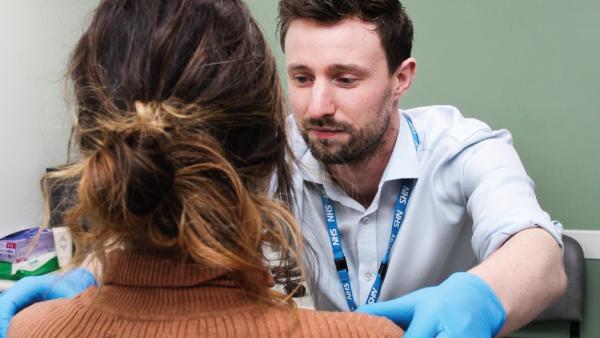After the introduction of the FCP roadmap, members share their successes and challenges. By Tamsin Starr

Last year, standards of practice for First Contact Practitioner (FCP) roles were heralded as a way to define career paths and ensure gold-standard care that put patient safety first. However, their introduction in England via the First Contact Practitioners and Advanced Practitioners in Primary Care: (Musculoskeletal) A Roadmap to Practice has not been without its challenges, not least landing in the middle of a pandemic when healthcare was stretched to breaking point.
Consultant MSK physiotherapist Chris Mercer, who is the primary and community workstream lead for the Best MSK Health programme, believes the roadmap has never been more important. ‘At a time when the demands on primary care are so challenging, it is vital that those working at the front end of the patient pathway are well trained and well supported to deliver the highest quality service to the patient,’ he says.
The FCP roadmap provides a robust national governance framework to support this process, and integrate FCP into the wider system governance. This links perfectly with the BestMSK Health programme ambitions.
Many physiotherapists who complete the roadmap, which can be done as university modules or as a portfolio, also view it as a step in the career path to Advanced Practitioner (AP), which is among its many benefits.
Four FCPs at different stages of the roadmap, told Frontline about their successes and challenges and shared tips on where to get help and support.
Valuable support
Natalie Heighway is an FCP Facilitator for Shropshire, Telford and Wrekin, Primary care Training Hub. She completed her roadmap through a Level 7 FCP masters module at the University of Central Lancashire. Her view is that the taught route is appropriate if you are planning to use it as part of a Master’s degree due to its academic emphasis – ‘though ultimately

it’s a matter of personal choice, so opt for whichever suits you best,’ she says.
She believes the roadmap will enable the future FCP workforce to have the right skills. ‘For those coming into the role it’s invaluable,’ she says. ‘It ensures they can get the support they need to be at the right level before they start the role and ongoing clinical support within the role.’
She advises physiotherapists to start thinking about the roadmap as early as possible and build evidence for their portfolio as they go. ‘Read and understand the roadmap as a band 5 or even as an undergraduate so you can pick training that is relevant for where you want to go and record it.’
For those struggling to choose the right evidence at the right level, she has this advice. ‘It’s about quality rather than volume, so it is better to have fewer documents that demonstrate a range of capabilities really well rather than having lots of documents that are not to the point. Discuss this with the supervisor who is signing off your capabilities as they are the ones who need to be confident you have met the Knowledge, Skills and Attributes document.’
Roadmap supervision
FCP Agnes Cyrek originally qualified in Poland, and credits the roadmap with helping her transition from NHS secondary care to primary care. ‘By completing the list of capabilities I gained the confidence to call myself an FCP and feel that I’d earned that title,’ she says.
Employed by the Primary Care Network in Bristol and based in two surgeries, she completed stage one and two of the roadmap through the portfolio route in an impressively short six months. She cites having a roadmap supervisor who was delivering training for FCP Roadmap and protected roadmap supervision time as the chief reasons behind her rapid success.
As for the benefits of completion, she says it has made her more organised and disciplined about recording her learning, which is ‘building a base’ for her AP registration. ‘Plus the daily debriefs with clinicians were opportunities for me to go through my caseload and check if there was anything else I should include in my consultations,’ she says.
Having this and the opportunity to apply new learning, recorded for the roadmap, to my practice added up to making sure patients are safe, and practitioners are safe, too.
She has tips for those starting their roadmap journey, starting with supervision. She approached an Advanced Care Practitioner at her practice to be her roadmap supervisor over a coffee, after they’d attended a roadmap training webinar together. ‘You must be honest with yourself and your supervisor about how much time it will take at the outset, and make sure you can still have a work-life balance.’
‘Then, check out the portfolio templates and tools on the HEE roadmap landing page. See how you can put evidence in one document and reassess before each supervision where the gaps are, then make the most of supervisions by focusing on the missing evidence.
‘Reflect on learning with the wider MDT – in our practice clinicians do webinars every Thursday morning so I reflected on how I could put that new learning into practice.
‘Don’t get involved in everything at once – make it useful for you and your practice. I did an audit of my notes assessing patients with low back pain as a first presentation comparing them with NICE quality standards as a quality improvement project and included that in my evidence but also improved my own practice through it.
‘In future we will have more FCPs who’ve completed the roadmap so reach out and ask for help from those who’ve been through it.’
Share your FCP experiences
Ian Roberts is a full-time FCP at a Harrow GP surgery. ‘Being an FCP is absolutely great – I’m well supported, I’m learning all the time, I love it,’ he enthuses. ‘The work required for FCP accreditation in the roadmap is demanding and doesn’t make me better at my job now, but it does reflect how far you’ve come as a clinician and provides a great career pathway to becoming an AP in primary care.’
He is completing stage one of the roadmap portfolio, and has broken down the ‘terrifyingly long list’ of capabilities into a table, grouping ones covered by the same piece of evidence. ‘This has given it a structure, so now I can work through them. A lot of capabilities can be grouped and mapped to the same pieces of evidence. In an appendix I intend to copy and paste evidence such as a research poster, abstract or a CPD document. It’s easier if you collate your CPD as you go – thankfully I used to email myself all of my supervisions.’
Peer support has helped, and Roberts has been proactive in setting up a network of local FCPs on email and WhatsApp.
‘You never know what you will learn from other people. Sometimes as an FCP you can feel isolated. I have a consistent support from my GP supervisor, but because many GP practices are embedding this role for the first time I think it’s important to connect with local FCP friends to share experiences.’
Collate your evidence
FCP Matthew Wedderburn is employed by independent provider Pure Physio and works in two GP practices. He has just completed stage one via a portfolio route. ‘It’s not been as stressful as I thought it would be, mainly because I’ve been given a lot of reassurance and guidance on what I need to do and how to do it,’ he says. ‘The main challenge has been getting all the evidence collated and making sure it meets the right criteria. But if you have the right structure and supervision in place it’s nowhere near as intimidating as you may think.’
Abi Henderson, head of FCP implementation at the CSP, says:
FCPs play a vital role in supporting primary care, now more than ever. FCPs must work at an advanced level of practice in the clinical pillar as a minimum to provide safe and effective services at the front end of the MSK pathway. The Health
Education England Roadmap provides a vehicle through which to develop and demonstrate capability against the standard of practice required. The CSP supports the use of the Roadmap as we believe it will drive safety and quality in primary care. However, we recognise that practical implementation has been challenging. HEE have developed the framework in a complex and evolving context, and at times, there has been a lack of clarity.
We worked with HEE earlier this year to gain flexibility on timescales for members and we urge employers and individuals to develop plans that are timely but achievable. We will continue to lobby for support and funding, at both national and system level, to ensure members can access appropriate education, training and supervision in realistic and timely ways to develop their capabilities and meet the Roadmap requirements.
Find Out More
Number of subscribers: 3




































